#reading more extras on toshiros interactions with laios is like
Text
prior to the ep coming out i just wanna say toshiro is 100% valid for his feelings on laios and also i had a visceral reaction to the falin stuff bc i love marcille so much but it's not really his fault
#dungeon meshi#dungeon meshi spoilers#like I don't think he's wrong for how he feels but also#that shit with his family and izutsumi. isnt his fault either even if im mad about it#i might post more abt this once the episode is actually out because the laios/toshiro situation is interesting#vagueposting#reading more extras on toshiros interactions with laios is like#ooooohhhhhhhhhhhh#it was hard for me to seperate my love for laios from how actually living that would be lol
18 notes
·
View notes
Text
Dungeon Meshi is obviously primarily about food, eating, and crucially survival through eating, but it's also focused on other aspects of survival. Sleep, rest, social ties and social exclusion. There's even extensive commentary on things like personal grooming (Marcille’s hair, Toshiro becoming depressed and no longer shaving), clean bathrooms, and other things. When it comes to disability these things are referred to as instrumental activities of daily life (IADLs), which are more complex things like shopping, housework, and cooking, which people need to do to survive, and activities of daily life (ADLs) which are the basic bare bones needs: eating, toileting, etc. Dungeon Meshi is concerned with the logistics of living and finding joy in those logistics.
This is super related to disability! Yes, Laios is autistic, this has been apparent from the beginning. But what does being autistic mean for him and the story? Mostly, it means his desires, goals, and the ways he goes about achieving them are strange, foreign, or baffling. He has different priorities than other people and the way he expresses those priorities are strange. They affect how he socializes, how he eats…
So, it absolutely makes sense that there would be a minor sideplot about activities of daily living and what it's like to be out of sync with everyone else when it comes to prioritizing things. It's Mithrun Time (he's gonna mith all over the place) and I'm so SO interested in the interplay of disability, caregiving and the logistics thereof, and intersectionality & privilege. Who needs care? How do other people feel about them needing care? How do they receive that care? And who do we think is worthy of receiving care and how does that interact with all these other factors?
Bunch of manga and extras spoilers past the cut:
“So, what's wrong with you?”
I see a lot of people talking about Mithrun's non-eye disability as a depression allegory, which I think is true, but I think it's also metaphorically/symbolically both a traumatic brain injury and a trauma response to sexual assault. The sexual assault aspect is pretty clear if you look at any of the symbolism of the actual disabling event: just look at it.
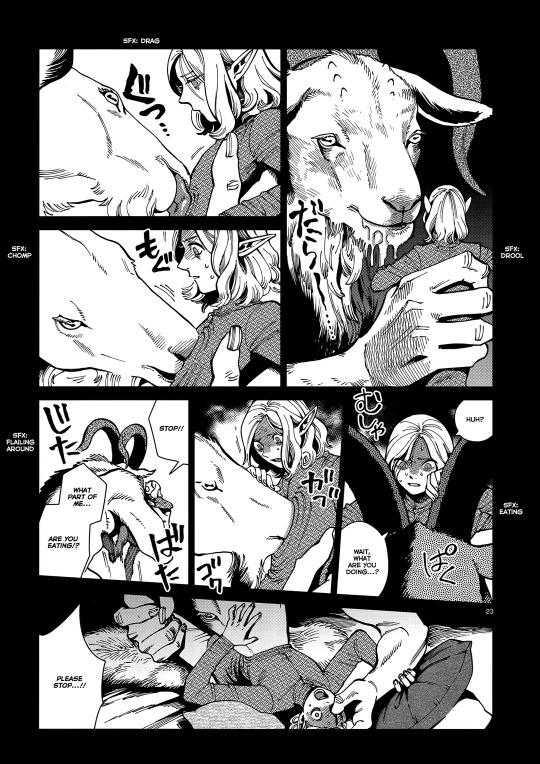
Mithrun is lying in bed and the goat comes to him, lifts him up and puts its mouth on his abdomen and lower pelvis. The eating is sexually charged, as is the particular way he struggles and protests. It's intensely violating, and things that were once desirable are lost. And the dungeon lord group therapy session involves a lot of people talking about the demons like an abusive lover; Mithrun, even though he wanted to kill the demon so badly, still says that they're gentle.
As for the brain injury, chronic TBIs can cause a wide variety of symptoms. Some immediately relevant ones are anhedonia (lack of enjoyment), executive function issues, poor interoception (trouble understanding what's going on in your body), cognitive impairment affecting ability to reason/multitask/plan/solve problems, changes in behavior and personality, depression, agitation, and restlessness. We see… basically all of these, in Mithrun, as downstream effects of the loss of desires. He can't tell when he's hungry, tired, or out of mana; he can't perform ADLs consistently even if he knows he'll die without doing them and dying without doing them will interfere with his long-term goal, he had drastic personality changes, he oscillates between impatient and totally withdrawn.
Brain injuries can also affect more complex tasks and ability to sustain lengthy periods of complex cognitive work. A common example is losing the ability to read and process longer passages; maybe you can read the words but you can't read a paragraph, or maybe you can read paragraphs but now you get a migraine after 15 minutes. Mithrun's skill loss is not related to reading but the effect is similar – he is and was extremely skilled in a particular area of magic, but also disabled in ways that specifically hinder his skill in this area – to teleport things properly you need depth perception and a sense of direction, and he lacks both of these! And while he's still an incredibly effective fighter it seems like he pretty frequently makes those sorts of mistakes.
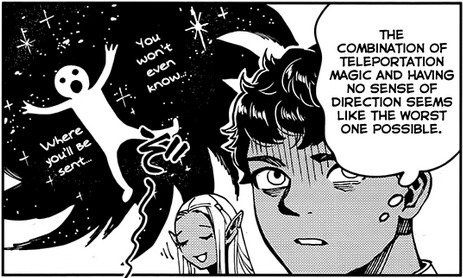
This is treated often as a gag and it is genuinely funny but it’s also very real, to no longer be as good at the thing you were good at before you became disabled. Kui takes several throwaway gags seriously later on, not just this one. Another ~gag that's not really elaborated on is the bathroom thing, but I appreciate its inclusion anyway, since even if it's presented humorously it doesn't feel meanspirited in a way a lot of “diaper jokes” do. I think people need to talk a lot more about bathroom issues in a wide variety of disabilities, and I think it's nice that a guy I can already picture the “poor little meow meow” posts about also has this issue, you know?
Preferences vs Desire
Even referencing PTSD and TBIs it's hard to really grasp what having no desires means, and the characters don't generally ask, while Mithrun explains it in vague terms. “Desires” is a very broad term and indeed he has lost access to a wide but related variety of things. Unfortunately this lead to him often being treated as nonagentic.
Mithrun does still have preferences, even if he doesn't express them and has no desire which would drive him to seek out pleasant things and avoid unpleasant ones. He'll comment on the taste and texture of foods, for example – sure seems like he has an opinion!
People treat it like his preferences don't matter since he doesn't usually bring them up unprompted, and he's often in situations where there aren't other options.
Kabru seems best at not doing this (and, noncoincidentally, also seems to be the best at actually caring for him; the Canaries have a lot more Resources theoretically than Kabru And Mithrun Eating Monsters And Kabru's A Bad Cook, but although they are loudly distressed by the two of them disappearing it seems to have positively affected Mithrun's general health)
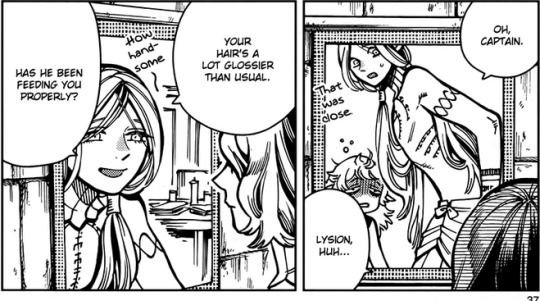
But, uh, acknowledgement that someone has preferences at all is a really low bar to clear and Kabru also doesn't seem to fully understand how Mithrun's brain works. Mithrun’s caregivers want him to eat when they want him to eat. They want him to rest and drink when they want him to.
He lacks the desire for a number of mundane things but also seems to lack the ability to tell when he needs them. He can't explain why he faints; is “I am out of mana” considered a desire for more mana, one that can be eaten? He can't sleep on his own; it's not only that he lacks “the desire to go to bed” but he can't do anything with his own exhaustion, even if he notices it. He comments on the unpleasant taste and texture of several meals; he may be unable to want to not eat it, but he definitely can tell when he dislikes something. But he also seems to be unable to tell when he's hungry.
Kabru will acknowledge these preferences but there's not really other food options, and Everyone Must Eat. Kabru doesn't know the details of Mithrun's condition yet but you can see the immediate frustration here and the way he offers food to him like Mithrun's a child.
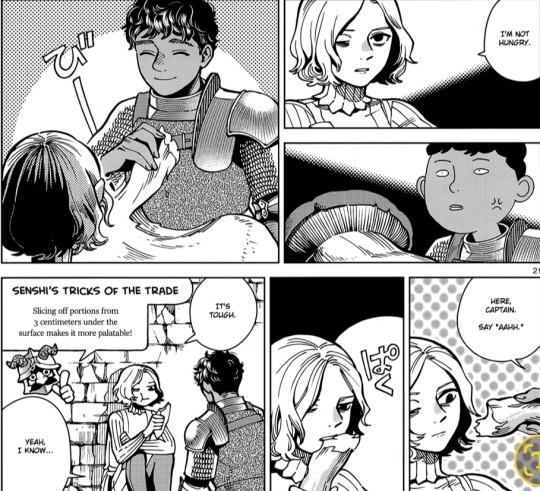
Sure, he won't directly communicate preferences, so that makes it extra hard, but you can always just ask, and if he tells you he tells you.
The pathway between opinion and taking actions about it may be lost in Mithrun but the dungeon forces other people into a similar position – it forces them to eat food they don't want to eat so that they can survive or accomplish other goals. We've seen this with Marcille from the beginning. It's difficult with Mithrun because it seems like there is always going to have to be some sort of someone else overriding his autonomy – yeah, he's not hungry but he still needs to eat or he'll faint. Yeah, he's lying about whether or not he's clean but he still needs to wash or he'll die. Yeah, he needs to take a rest instead of keeping moving or he'll faint. But he's not unique in being in a situation where he has to do nonpreferred things. The difference is more that he lacks the ability to independently do anything when it comes to ADLs, preferred or not, which makes it into someone else’s choice and responsibility.
There's also a theme in Dungeon Meshi that comes up a bit of people being pushy about ADLs but from a slightly different perspective, and they're usually right. You see this in Senshi most commonly; he pushes the residents of the Golden City to actually eat even if they don't need to and can't taste it, and while he's correct in that Yaad does get enjoyment from the food even without taste he's still not quite listening to Yaad. Similarly, Kabru is correct in that he can get Mithrun to sleep without a sleeping spell, but he also ignores the way Mithrun says several times that he doesn't expect massage to work. There's a few aspects to this – wild but expected that the elves would choose the “just knock him out with a spell” route, the “easy way” Senshi always talks about when it comes to magic, instead of actually paying attention to other solutions. But also, generally, people know their bodies best, and sometimes even if you're really sure you have the trick to help them you have to listen to what they tell you.
tvtropes dot org frontslash DisabilityTropes
This is going to be a harder section just because it's so subjective; it's nearly impossible to think about the ways in which disabled people are viewed by the people around them/wider society with any degree of objectivity just because there are so many factors that go into it. But I do think Mithrun is consistently treated as relatively nonagentic and there are several ways this can manifest: being treated as a doll/pet/child, being treated as a weapon, and being a surface for people to project onto.
He's framed or treated as childlike intermittently through the manga; scattered about, just a little vibe in the way he's drawn, like the "say aah" above and Pattadol and Cithis through the teleportation scroll :
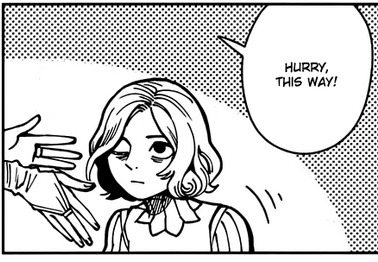
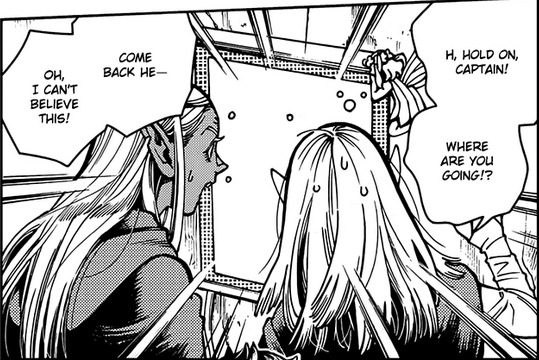
That's a middle aged man! And he's framed like a toddler getting picked up or misbehaving.
Which doesn't mean they care about him any less; his squad is really fond of him for someone who's technically like their parole officer. How dare you do this to our captain! They love him dearly; this is obvious and he comments on it! They respect him, too, as the leader and as a strong fighter. But loving someone and thinking they're a skilled fighter doesn't mean you respect their autonomy fully.
There's also an element of everyone projecting their own issues onto him; Kabru with their shared Dungeon Trauma. The canaries all suggesting wacky, midlife-crisis desires. He doesn't ever express that he minds any of this, except when they try to stop him from making particular decisions. They also don't often understand why he'd be motivated to do a particular thing, and in fact some of these projections may actually be correct! But while noodles and pottery may be good later-on goals for him, I think it's striking that a) Kabru was the closest to correctly guessing what desire Mithrun might acquire now and he was still guessing the exact opposite (suggesting a desire to not eat Falin but to help Laios, vs Mithrun's actual desire, which was to eat Falin with no thought given to the promise he made at all) and b) it's a desire that actually makes perfect sense with what we know about him, not something totally new.
And, finally, he's a weapon: people are willing to caretake him because he's good at killing things dead. If his only desire is to kill demons dead, it's easy to start seeing that as who he is. I don't think he'd argue that “trying to kill demons” takes up the majority of his life (it's his only goal and he's obsessed with it) but even if there's only one thing that matters to him he has autonomy (in the sense that he can make his own choices about what to prioritize and formulate his own plans) and personhood.
Politics and privilege – who gets to access care?
One of the things we're first presented with when it comes to Mithrun is that he is intensely capable at handling dungeons. Yeah, there's the immediately visible prosthetic eye and the navigation issues, but the Canaries are built up as being incredibly dangerous and skilled, and he's their captain; they all immediately defer to him. He's intense, he curbstomps an entire room of guards, he's efficient, he's brutal, he's strong physically and magically.
In short: yeah, he's very disabled. He's also still very useful.
At the risk of oversimplification, even within his particular disability, he's much more disabled than Marcille is (she lost something relatively simple and easy to miss, she has no catatonia-moment) but less disabled than Thistle, who seems to still have at least one desire related to the king but is still primarily catatonic. It seems like Thistle is not unusual among ex-dungeon lords, even if there's enough noncatatonic dungeon lords to form a support group later. When Milsiril finds Mithrun, she immediately intends to mercy-kill him – this seems to be a condition the elves are familiar with but consider terminal, at least to the degree Mithrun is affected, and people seem unfamiliar what it means to keep living in this state because Mithrun is unusual in that he survives at all. And he's “allowed” to survive initially because he's not as disabled as he could have been (still has a desire) and that desire is useful. They aim him at the dungeons and off he goes. It takes twenty years for him to recover enough to do it, sure, but they're elves. They can wait. He can still be useful.
Relatedly, when he loses the ability to pursue his desire he's immediately much worse off than he was previously.
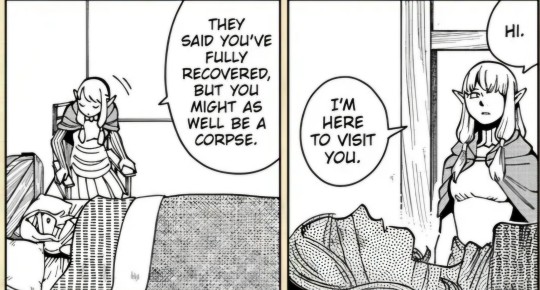
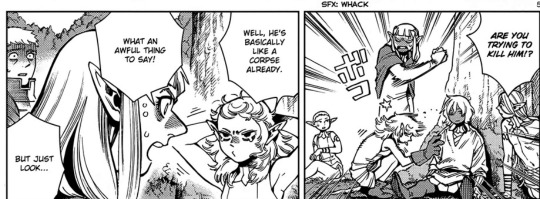
The no-desire catatonia is something that can recur and the elves continue to not know how to handle it. If Kabru wasn't there to problemsolve I think he'd have just… stayed there with his increasingly distressed squad.
Speaking of his squad, there's also a fascinating power dynamic going on with just the inherent structure of the Canaries; criminals are assigned as his caregivers. There's the inherent unfairness to the criminal Canaries about them being given extra duties, this strange rich noble guy who's now their Responsibility. There's so much possibility for resentment in normal caregiving relationships, much less being forced by your jailor into caregiving someone. But there's also an element of the power the prisoner Canaries now have over him and his most basic ADLs and needs. Assigning Cithis to his care is such a can of worms! The dynamics of the situation are frankly awful for both of them; of course she resents him initially. It would be strange for her not to. When Pattadol catches her making Mithrun do embarrassing things, she instantly reminds Cithis of her lower-status – she's forced to care for this nobleman and then forcibly reminded that she's beneath him.
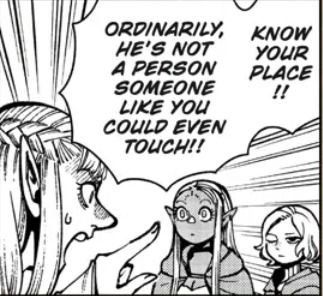
She's responding to having menial, low-status tasks forced on her by trying to humiliate him, and although he doesn't have the ability to care enough to stop her it's still a deliberate removal of dignity. He's the instrument with which she is punished and she punishes him in return (until it's not fun anymore and she understands him a bit more.)
Mithrun is a long-lived race, who has structural power over the shorter lived races simply because of how long they live. The dwarves and elves try to actively keep certain knowledge from other races, restricting their access to technology, and other expressions of distance. Senshi spends nearly the whole first season not listening to Chilchuck trying to explain that he's an adult and treating him like a child, and Kabru repeatedly says that the elves do the same thing (and tbh we see them doing it). There's even the fact that it took him twenty years to recover enough to join the Canaries again; a shorter-lived race might have died from old age in this time, or become too old to work in this capacity, and then wasted away without the drive to return to the dungeons. But they're elves; the other elves can afford to wait, and he's not going to age out of dungeoneering any time soon. Being an elf probably contributes to his wealth in the same way skin color contributes to wealth inequality in the real world.
Dungeon Meshi doesn't really go into race in the sense of skin color much, and Kui is writing from a different cultural standpoint than I am. While tallmen are quite accurate when it comes to skin/hair color (yes, even Kabru and his blue eyes; it's rare but possible) and cultural references, the elves, uh, absolutely are not, both in the sense of “dark skin & pale hair and eyes trope” and sense of the royals having jet black skin.
Still, I feel like race is so connected to care and caregiving in the real-world west that I would be profoundly remiss not to mention it. Skin color might not matter to elves in the racism sense, but it matters to humans and humans are the ones writing and analyzing this story. (And I fully expect as the fandom grows with anime-onlies people will like Mithrun more because he's white (has white features) than they would if he had darker skin, because fandom is also baseline racist.)
I don't think we can just not mention that Mithrun is pale-skinned and both Cithis and Kabru, his primary caregivers over the story, both have dark skin.
Racism means white people are more likely to get good medical care, the type you need to get diagnosed and prescribed caregiving. Racism means wealth distribution is uneven, favoring white people. Race affects immigrants taking on undesirable jobs like caregiving for low pay. Racism is a profound stressor which means it contributes to who becomes disabled in the first place in that it can worsen health outcomes.
Similarly to race, gender may not be very obvious when it comes to this subplot within the story but the gendered dynamics of caregiving in the real world are something I do want to touch on. There's an oft-cited statistic about how men are much more likely than women to divorce their partners when their partners are diagnosed with a serious condition; I don't like relying too much on those sorts of statistics because they can be so misleading but it does gesture at something very real, culturally. Even if men aren't supposed to be caretaken, women are supposed to be the caretakers. Certainly, it's not Mithrun's fault that he can't cook and can't do laundry and probably can't do most housework, but I do also think about all the posts passed around about “my boyfriend who won't do housework.”
Again, none of these privileges make him less disabled and less in need of and deserving of care, they're just worth talking about when we talk about caregiving in general.
It's Rotten Work, Even If It's You
People expect disabled people receiving care to be grateful, to accept anything, and to try and make it easier for the caregiver if they're able. Requiring care is an incredibly disadvantaged position, even as actually receiving it can be so tangled up in privilege. Caregiving is tremendously difficult work, it's true, but there's a particular vibe people want from disabled people – all those movies about not wanting to be seen as a burden. Never complaining. Being grateful.
And, uh, well…
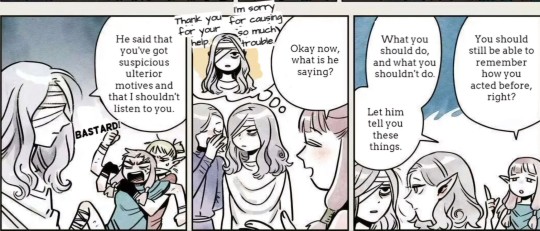
Mithrun basically accepts anything his caregivers do, but he's not grateful at all! I appreciate that in a disability portrayal. He'll also lie to and ignore his caregivers, which is Annoying but is definitely an expression of autonomy even if he's probably not doing it specifically to express his autonomy. He's not going to thank you. He's not going to make it easy. He'll accept a lot of things considered “undignified,” and he's not mean or unpleasant in the sense that he's taking advantage or anything, but he's certainly not a model patient.
He's running off back into the dungeons just when you think you've finally gotten him somewhere safe.
There's always a strange tension in caregiving, I've found. It is incredibly intimate but a lot of it is done by total strangers. A number of caregiving tasks are viewed by the wider world as entitled but placing those tasks in the hands of strangers is a remarkably tough place to be in. As a disabled person, I've had to accept my bowel movements being discussed with my parents’ friends, all sorts of being physically moved places not against my will but without my permission, even my pubic hair being shaved off by a stranger (nurse) while I was unable to speak or move. When people are feeding you, making sure you use the toilet, rubbing your feet to make you sleep, helping you with hygiene – people are working so hard to help you. Are you supposed to just accept them doing whatever they want to you?
There's also a dynamic where people will say they don't mind caring for you, they're happy to do it, and then as the years go by and you continue to need care the resentment just builds up. Caregiving is hard work. It's often thankless. The goodness of people’s hearts can run dry, when it's been twenty years and you still can't bathe yourself.
Aaand I need to continue in reblogs, because I'm out of space for images. Please hold. edit: you can find part 2 here
#eat or be eaten#I'm real and I beat myself up behind the Blockbusters#tbh i tried not to talk about myself too much here. but uhhhh caregiving issues are so tender for me#tender in the ouch way not the gentle way#anyway#dungeon meshi spoilers#dungeon meshi#mithrun
406 notes
·
View notes